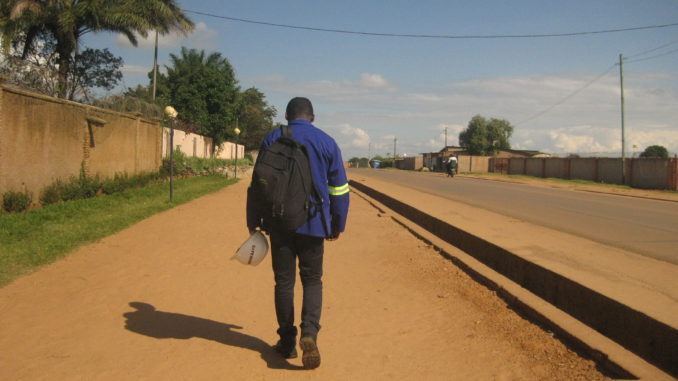
Kristien Geenen is an anthropologist affiliated to the University of Liège and a member of the WORKinMINING project, a collective and comparative research project on how the labour policies of new mining investors are negotiated by different categories of people in Congo and Zambia. The Principal Investigator of this ERC-funded project is Benjamin Rubbers. Kristien’s research deals with the unions of the mining industry in the Congolese Copperbelt. She is currently carrying out fieldwork in the city of Kolwezi. Below she explains her approach.
Fieldwork methodology among a multiplicity of unions
Kristien Geenen
In contrast to Lubumbashi, rather a patchwork of a city, all Kolwezi exudes is mining. Mining companies’ jeeps and buses cross the city all the time, and so do miners heading for work, their helmets clutched under the elbow. Almost every family has a member who is involved in the mining industry in one way or another. Inhabitants define their city as the “poumon” (the lung) of the mining industry, “la ville minière par excellence.” This perception attracts unemployed out-of-towners too, they flock in and gather underneath the “trees of pity” in front of the mining companies, hoping to be called in and, eventually, sign a contract.
There are many unions in the DR Congo, more than 400 it would seem. As the union fee is deducted directly from the miners’ salary and the mining company usually has many employees, setting up a union, or a “maison syndicale” as they call it here, has become a tempting alternative means of income. As a result, just before the social elections that are organised at the companies, where workers vote for a maison syndicale to represent them, many individuals give it a shot, set up a union and start campaigning. It is often a family affair, too, with husband, wife, children and relatives joining forces. Needless to say there is a lot of competition going on among the many maisons syndicales. However, it is usually those with a longstanding tradition that obtain the majority of votes, while the new ones just fade away.
During my current three-month fieldwork trip, I am attempting to understand the workings of the unions in the mining companies around Kolwezi. My research methodology consists of basic ethnography; hanging around and conversing with union representatives, managers, workers and jobseekers. Through both informal and in-depth interviews, I try to get a general idea of the unions’ day-to-day functioning, and of the ways the unions are perceived, approved or contested. Although I’m adding new interviewees – who I might only meet once – every day, I’m also gradually establishing a network of fixed informants who I have selected because of their natural ease as interviewees, and with whom I meet on a regular basis. While interviewing, I’m very interested in finding out the representatives’ motivations for joining a union and why exactly they picked this one particular union. Usually, the shop stewards are eager to share their views and experiences, talking very passionately about their duties, while the upper echelons are more reluctant to do so. But I’m very patient. As well as the union representatives, I’m also interviewing workers who used to be unionised but decided to resign their membership out of disappointment, trying to understand what caused this disappointment.
Furthermore, I am trying to get a firm understanding of the relationship between the management and the unions. Recently, for instance, a Chinese run company reluctantly allowed union presence on its work floor; I’m following closely – or as closely as possible – how the negotiations between the management and the unions proceed, and to what extent the different cultural background of the company is a factor during these negotiations.
Labour Day also gets my attention. I’m attending the preparation meetings for this yearly parade, paying attention to trivial details such as who decides which union will march in the front of the parade, and on what grounds. This parade will allow me to focus on trade union identities, and ways to attain visibility. During my next four-month trip, from November 2017 onwards, I will continue to gather this data, and will also closely follow the preparations and campaigning during the social elections.
All this very basic material will eventually shed light upon the diverse field of unionism in the city of Kolwezi, and beyond. I hope to learn more about what remains of the longstanding tradition of industrial paternalism in the former Katanga province, and whether related concepts/claims surface during the negotiations of the collective agreement. I want to find out whether the coming of new actors with diverse backgrounds during the recent mining boom has led to modified work regimes or corporate social responsibility, and what part the unions play in this eventual change.
On a larger scale, the aim is to obtain a deep understanding of the micropolitics of work in the Congolese and Zambian Copperbelt. My fellow team members on the WORKinMINING project are based in cities on both sides of the border, and we regularly team up to approach our findings from a comparative angle.
